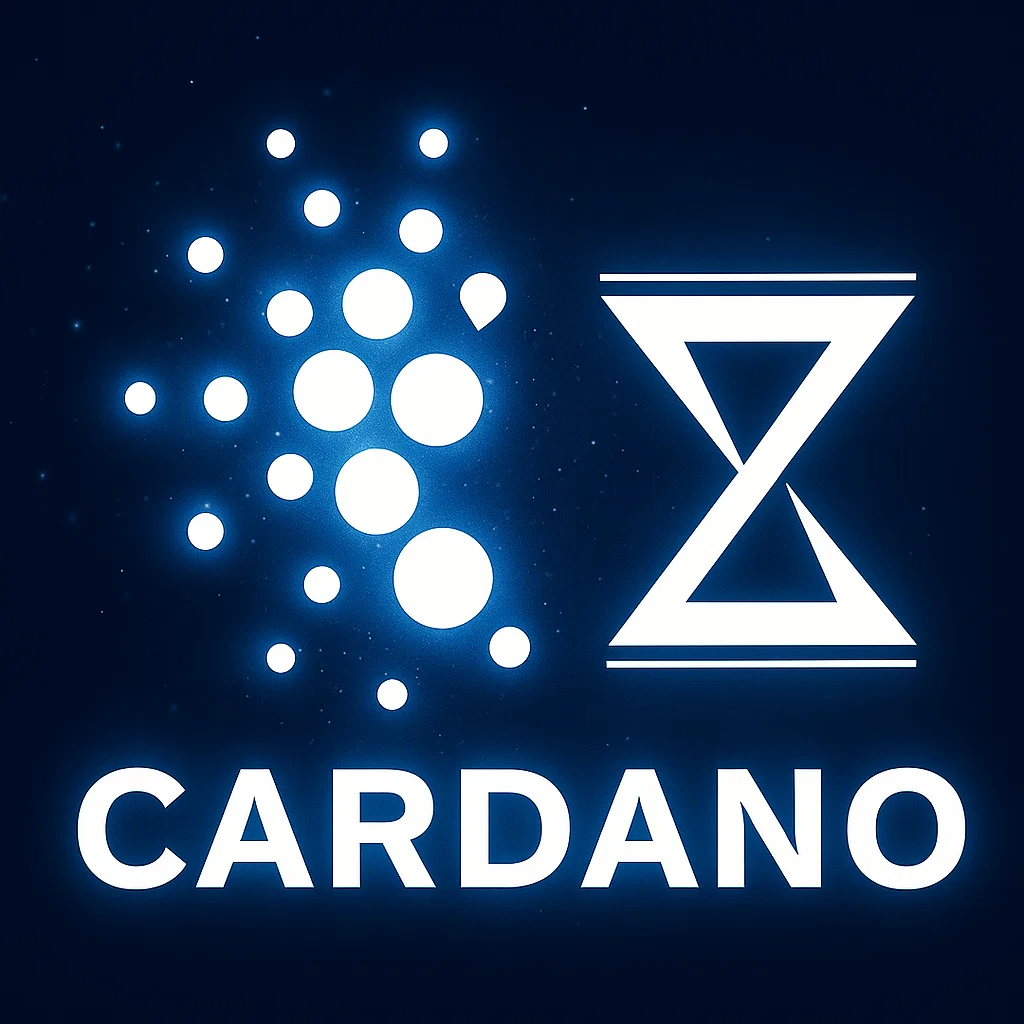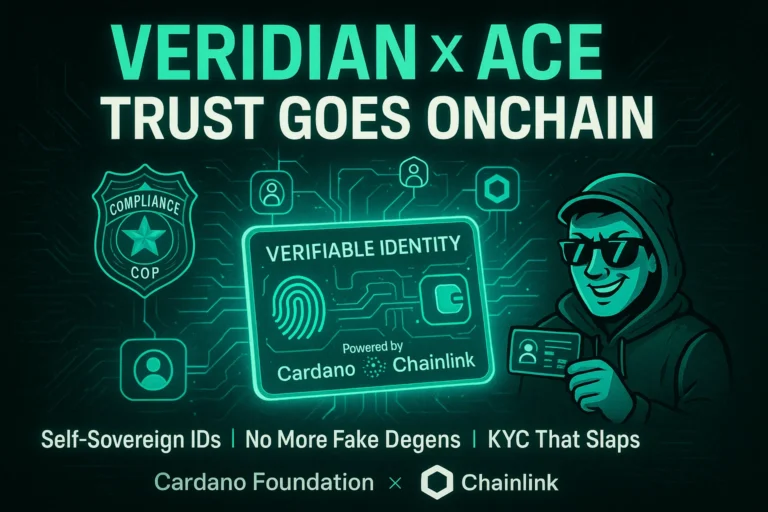🧩 Cardano Foundation’s Veridian – The Digital Bouncer of Trust
Okay, picture this: everyone’s trying to get into the hottest Web3 club — the one where only verified legends get past the velvet rope. Most people are waving sketchy PDFs or centralized KYC screenshots.
Now, imagine walking up with a wallet that proves who you are cryptographically — no middlemen, no leaks, no “oops, we sold your data to an ad network.”
That’s what Veridian is doing for Cardano.

Cardano Foundation’s Veridian platform is basically a digital identity engine for the trustless internet.
It gives both humans and organizations a way to say “yep, that’s really me” — without handing over your life story to some centralized database that gets hacked twice a year.
🔐 How Veridian Works (ELI18 Edition)
Think of Veridian as a crypto wallet for your identity.
Instead of storing coins, it stores verifiable credentials — like your driver’s license, business registration, or proof that you’re a real human.
And it’s all built using open standards like:
- KERI (Key Event Receipt Infrastructure): a decentralized identifier (DID) system that lets you prove identity without a central authority — no one owns your ID but you.
- ACDC (Authentic Chain Data Containers): encrypted data packets that carry only what’s needed to verify you. Think “zero-knowledge LinkedIn” — proofs, not oversharing.
In short: you own your digital identity. No government portal, no password reset emails, no centralized database waiting to be exploited.
🌍 Why It Matters (and How It Connects to Chainlink ACE)
Here’s where things get galaxy brain 🧠✨:
Veridian plugs directly into Chainlink’s Automated Compliance Engine (ACE).
This means that ACE can now use Veridian-issued credentials — verified offchain using GLEIF’s vLEIs (verifiable legal entity identifiers) — and bring them onchain as CCIDs (Cross-Chain IDs).
Translation for non-devs:
ACE becomes the compliance cop, but Veridian is the passport office.
You prove your identity once with Veridian, it mints you a reusable verifiable ID, and ACE recognizes it automatically across multiple chains — no re-KYC, no endless form-filling, no trust issues.
⚡ Veridian’s Key Features (a.k.a. Why It’s Built Different)
- 🪪 Self-Sovereign Identity: You control your credentials, not some centralized server.
- 🧠 Post-Quantum Security: Future-proof cryptography designed to outsmart even next-gen AI exploits.
- 🌐 Global Interoperability: Works across industries and blockchains — healthcare, finance, whatever.
- 🔍 Verifiable Authenticity: Every credential can be proven as legit without revealing the data behind it.
- 🧾 Full Transparency: Built on open-source Cardano infrastructure — auditable, public, and permissionless.
- 💸 Cost-Efficient Scalability: Enterprise-grade identity at a fraction of TradFi costs.
🤝 The Chainlink x Cardano Play
By linking Veridian with Chainlink ACE, the two ecosystems just created a real bridge between Web3 privacy and real-world compliance.
It’s like if your Cardano wallet got a KYC superpower — but still stayed non-custodial, anonymous where it matters, and verified where it counts.
In practice, this means:
- Enterprises can onboard verified investors directly onchain.
- DAOs can prove member legitimacy without compromising privacy.
- Developers can add verifiable identity checks to dApps with a few lines of code.
Veridian is the proof that decentralized identity doesn’t have to be dystopian — it can be the foundation of real digital trust.
TL;DR:
Veridian makes sure your digital ID belongs to you.
Chainlink ACE makes sure that ID behaves legally onchain.
Together, they make compliance cool — and Cardano officially part of the global identity revolution. 🔗🪪
🧠 Real-World Use Cases — Why Veridian + ACE Will Matter More Than Ever
Let’s be honest: right now, most people only think about compliance when something goes wrong.
But as crypto keeps maturing — and regulators finally realize Web3 isn’t just about dog coins — projects that can prove identity, trust, and legal eligibility will dominate.
That’s exactly where Veridian + Chainlink ACE come in.
1️⃣ Onchain Finance — When Institutions Join the Party
Imagine a global bank launching tokenized funds on Cardano or Ethereum.
They need investors to be verified (KYC ✅), funds to comply with local laws, and transfers to follow AML rules — all without faxing 200 pages of compliance docs.
With Veridian providing verifiable digital IDs (vLEIs) and ACE enforcing those rules automatically, these institutions can issue tokenized bonds, equity, or RWA assets that are both decentralized and fully compliant.
It’s like DeFi got a TradFi passport — but instead of a banker stamping it, it’s a smart contract doing the checks in real time. 🏦💻
2️⃣ DAOs & Governance — Proof You’re a Human, Not a Bot Farm
Ever seen a DAO vote hijacked by 500 wallets from one dude in his basement?
Yeah, Veridian kills that. 🧨
Using Proof-of-Human credentials and decentralized IDs, DAOs can ensure that each voter represents one verified, unique participant — no spam, no Sybil attacks, no “oops 4 whales decided the entire treasury.”
Chainlink ACE enforces that rule at the protocol level, without revealing personal info.
Privacy-preserving democracy, baby. 🗳️🕶️
3️⃣ DeFi Protocols — When Compliance Meets Yield
Protocols that integrate ACE with Veridian credentials can run KYC-compliant lending, staking, and yield operations — no middlemen, no custodial nonsense.
That means EU or US-regulated funds can finally deposit liquidity into DeFi pools that meet their risk and regulatory profiles.
It’s not “degen yield,” it’s “institutional yield with receipts.” 📈
4️⃣ Healthcare, Supply Chain & AI — The Boring Stuff That Runs the World
This combo won’t just live in crypto.
In the future, Veridian IDs could prove a doctor’s license onchain before issuing a prescription, or validate a component in an IoT supply chain before it talks to your car’s AI.
Chainlink ACE ensures that the transaction (or data feed) happens only between verified entities.
In short: every serious system — from logistics to AI to energy grids — will need a verifiable identity layer.
And Cardano’s Veridian, plugged into Chainlink’s ACE, is already building that foundation.
5️⃣ Everyday Users — Owning Your Digital Self
Maybe you’re not a bank or DAO dev. You’re just someone tired of filling out 9 forms every time you sign up for something.
Veridian will let you carry your verified digital identity across services — from exchanges to dApps to government portals — without redoing KYC every time.
You’ll own your credentials, share only what’s needed (“yes, I’m over 18” not “here’s my full passport”), and revoke access anytime.
It’s the Web3 version of “Sign in with Google,” but without the surveillance.
💥 Why This Will Be Crucial in the Next 3–5 Years
- 📈 Regulated DeFi: As tokenized assets (RWA, ETFs, funds) hit the blockchain, regulators will demand verifiable compliance frameworks — and ACE + Veridian are plug-and-play ready.
- 🧠 AI & Machine Identity: When AI agents start transacting autonomously, they’ll need verifiable identities too. Veridian’s cryptographic credentials make that possible.
- 🌐 Cross-Chain Interoperability: ACE + Veridian IDs work across ecosystems — so your verified identity on Cardano can transact safely on Ethereum, Linea, or Taiko.
- 🏛️ Regulatory Clarity: Governments want compliant rails, not censorship. This system offers both — privacy for users, auditability for regulators.
- 💳 Consumer Adoption: Real-world payments, healthcare access, DeFi logins, all powered by cryptographic identity — no data leaks, no duplicate accounts, no KYC fatigue.
TL;DR:
Veridian + Chainlink ACE is the Web3 equivalent of HTTPS for identity — invisible when it works, vital when it doesn’t.
It’s not just about compliance — it’s about trust, scale, and making the decentralized world safe enough for the real one to join in. 🌍🧩




